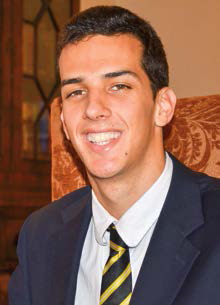 In 1970, President Richard M. Nixon '34 signed into law the Comprehensive Drug Abuse Prevention and Control Act (CDAPCA), a revolutionary statute that initiated America’s “War on Drugs.”
In 1970, President Richard M. Nixon '34 signed into law the Comprehensive Drug Abuse Prevention and Control Act (CDAPCA), a revolutionary statute that initiated America’s “War on Drugs.”
More than 40 years later, political science and history double major William Hougan ’14 is seeking to better understand Nixon’s drug policies and their enduring effect, as the 2013-2014 Richard M. Nixon Fellow.
As Hougan puts it, Nixon was really the first U.S. president to confront the contemporary issue of drug abuse and take a stand, enacting laws that were not only revolutionary in their implementation, but have left a kind of bureaucratic legacy.
“[The wording within the act contains] categorizations of the different kinds of substances that changed how the federal government regulates, controls— and if necessary, bans—drugs, as well as the public’s perception of these drugs.”
Hougan combined his research on the CDAPCA with his experience as an intern in the office of the Orange County Public Defender in Fullerton. Additionally, he conducted extensive research in the archives at the Nixon Presidential Library & Museum, where he had previously served an internship.
Working with an investigator in the public defender’s office, Hougan saw first-hand the impact of Nixon’s drug policy. The number of cases related to drug possession and distribution are second only to DUIs.
“[These cases] directly tie into policies that were first put into place by the Nixon administration.”
Hougan’s main job was to assist public defenders by acting as an intermediary between the clients and attorneys, reading police reports, clearing up the client’s story, and passing it on to the attorneys.
According to Hougan, interviewing clients put a real face to the policies that he had been researching.
“[Often] we think of these cases as guilty until proven innocent, and that’s the mentality that really shouldn’t be taken. [This experience] has definitely taught me to be more tolerant, to be more open-minded when dealing with people.”
Hougan presented his final project during the Whittier Undergraduate Research, Scholarship, and Creative Arts conference this spring. After graduation he plans to attend law school to become a criminal defense attorney. — Veronica Galbreath, M.A. `12